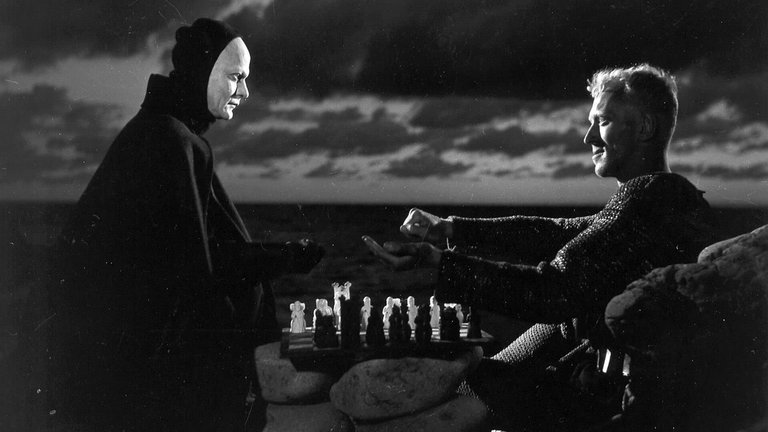Film Review: The Seventh Seal (Det sjunde inseglet, 1957)

Ingmar Bergman's filmography boasts many notable titles, but none has attained the iconic status of his 1957 historical fantasy drama, The Seventh Seal. Generally considered one of the best-known art films of its time, this masterpiece stands out for its powerful narrative and visually arresting imagery.
Set in 14th Century Sweden, the plot revolves around Antonius Block, a knight played by Max von Sydow, who has spent the last ten years fighting in Crusades and is now returning home to his castle and wife. Accompanied by his cynical squire Jöns (played by Gunnar Björnstrand), Block grapples with the violence and destruction he has witnessed, prompting him to question the meaning of life and existence of God. This existential crisis unfolds as the land is struck by plague, putting Block himself at risk of becoming its victim. As Block travels through the plague-ravaged countryside, he encounters a diverse cast of characters, including the traveling entertainer Joff (played by Niels Poppe), his wife Mia (played by Bibi Andersson), and their toddler son. Among these encounters is an encounter with Death personified (played by Beng Ekerot), with whom he starts game of chess, trying to win temporary reprieve from his inevitable fate.
The Seventh Seal marked a turning point in Bergman's career. Bergman already had prolific filmography, but most of those works were conventional contemporary dramas. The Seventh Seal was more ambitious, both visually and thematically. Set in the distant past and tackling issues of religion, this film would become characteristic of many of Bergman's works to come.
Despite its modest budget, The Seventh Seal is a visually impressive film, thanks in part to Gunna Fischer's excellent black-and-white cinematography and Bergman's skilled use of symbolic imagery inspired by Swedish medieval art. Iconic scenes such as the opening chess match on the seashore and the closing dance macabre have become instantly recognisable images of 1950s world cinema.
Bergman based his script on a one-act play he had written for his acting students, drawing heavily from his own experiences growing up as the son of a Lutheran pastor, as well as feeling of guilt over misguided sympathies for Nazism in his early years. He also infused the film with elements of apocalyptic vision, making medieval Sweden struck with plague, famine, violence, fanaticism and bigotry reflection of the fears of the Cold War era, where Sweden and the world faced potential nuclear annihilation.
The Seventh Seal boasts not only excellent direction but also strong performances from its cast. Max von Sydow delivers an outstanding portrayal of Block, launching a fruitful collaboration with Bergman that would make him an international star. The film also works as an ensemble piece, allowing many memorable supporting roles, such as Bengt Ekerot's sinister Death and Nils Poppe's comic relief. Bibi Andersson, actress who had romantic relationship with Bergman at the time, brings a lot of charm, warmth and humanity in her role, thus helping audience endure this bleak tale.
However, The Seventh Seal is not without its flaws. One area where the film falters is in its dialogues, which can sometimes feel overly theatrical and self-consciously poetic. Bergman's script has been criticized for being heavy-handed at times, with characters delivering long, stilted monologues that feel more like philosophical treatises than natural conversation. Additionally, Erik Nordgren's soundtrack does not quite meet the expectations of a cinematic masterpiece.
Despite these flaws, The Seventh Seal helped cement Bergman's reputation as one of the foremost filmmakers of his time. It garnered critical acclaim and won several awards, including the Special Jury Prize at the Cannes Film Festival in 1958. In the years since its release, it began to win top spots in critics’ polls about best films ever made. This helped it become a cultural touchstone, influencing countless filmmakers and featuring prominently in discussions about cinema history. Its iconic images have permeated popular culture through references in comedy sketches by Dave Allen to Hollywood blockbusters decades later, solidifying its status as a true cinema legend.
RATING: 7/10 (+++)
Blog in Croatian https://draxblog.com
Blog in English https://draxreview.wordpress.com/
InLeo blog https://inleo.io/@drax.leo
Hiveonboard: https://hiveonboard.com?ref=drax
Rising Star game: https://www.risingstargame.com?referrer=drax
1Inch: https://1inch.exchange/#/r/0x83823d8CCB74F828148258BB4457642124b1328e
BTC donations: 1EWxiMiP6iiG9rger3NuUSd6HByaxQWafG
ETH donations: 0xB305F144323b99e6f8b1d66f5D7DE78B498C32A7
BCH donations: qpvxw0jax79lhmvlgcldkzpqanf03r9cjv8y6gtmk9
Posted Using InLeo Alpha
Congratulations @drax! You have completed the following achievement on the Hive blockchain And have been rewarded with New badge(s)
You can view your badges on your board and compare yourself to others in the Ranking
If you no longer want to receive notifications, reply to this comment with the word
STOP